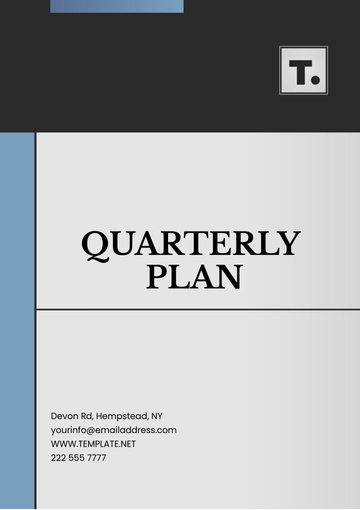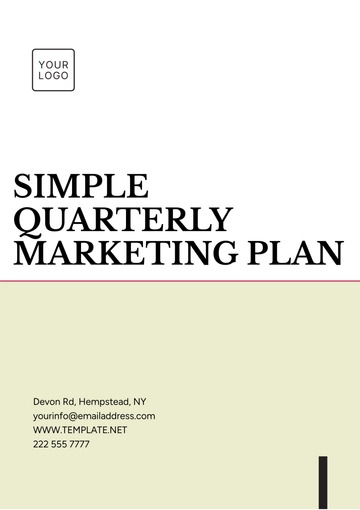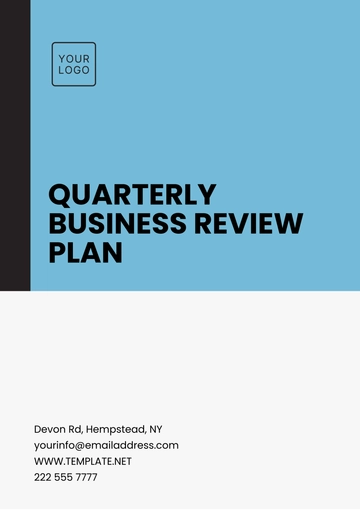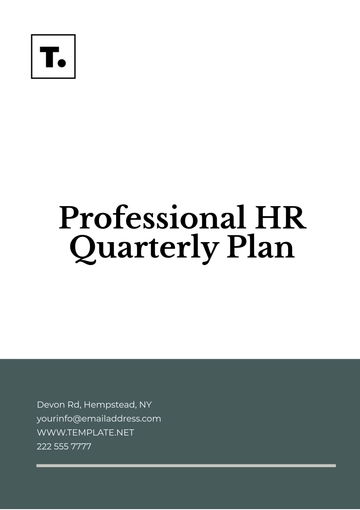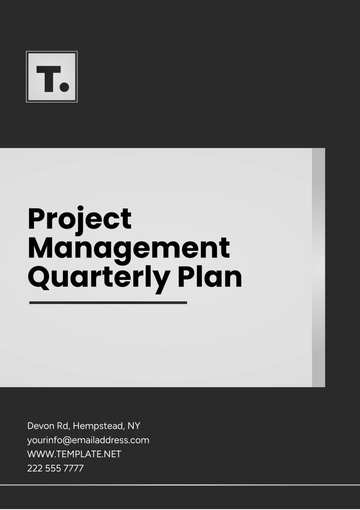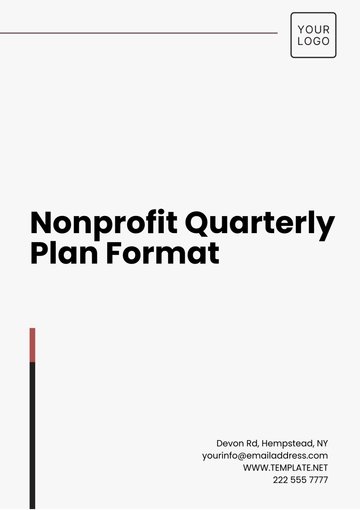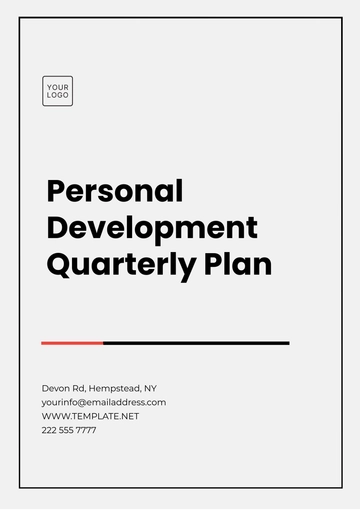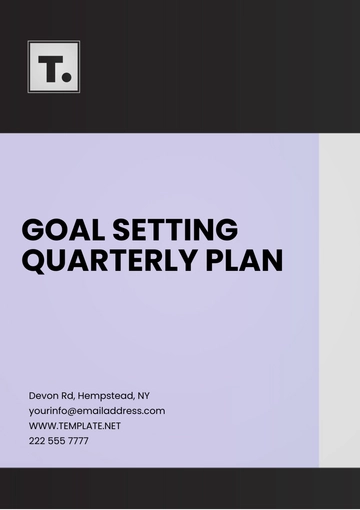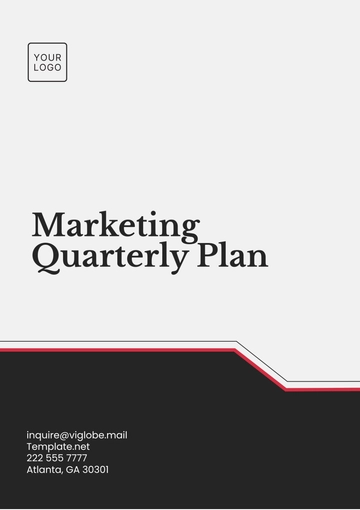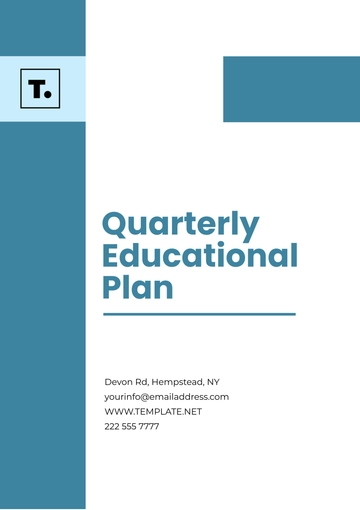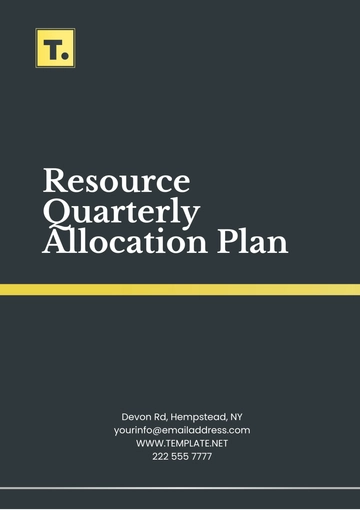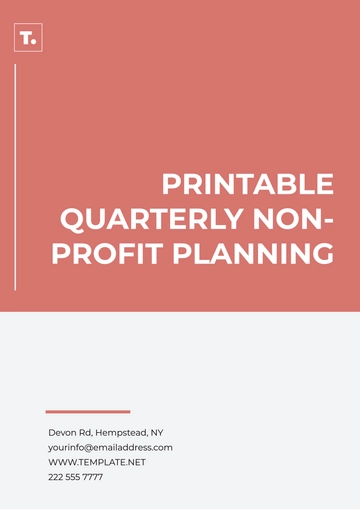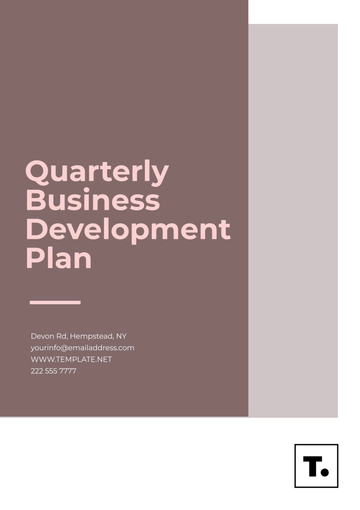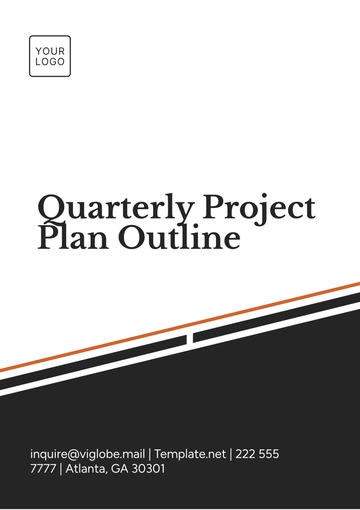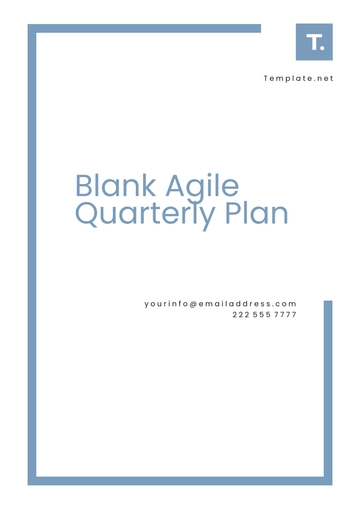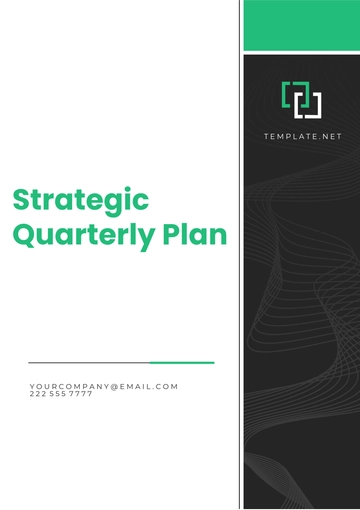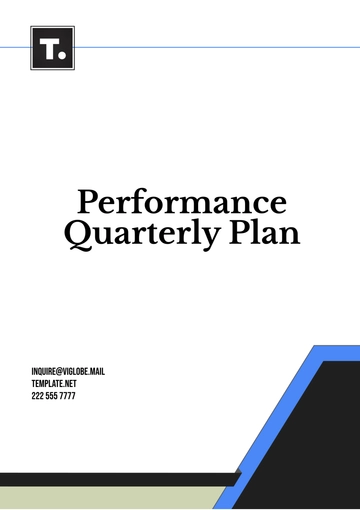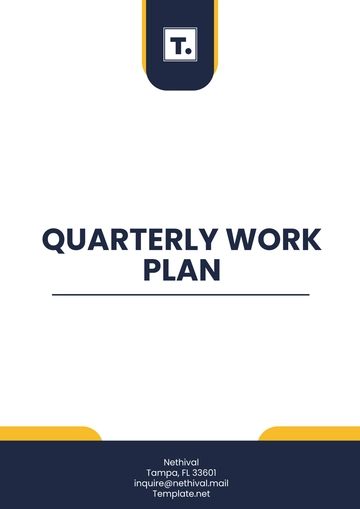Free Quarterly Educational Plan
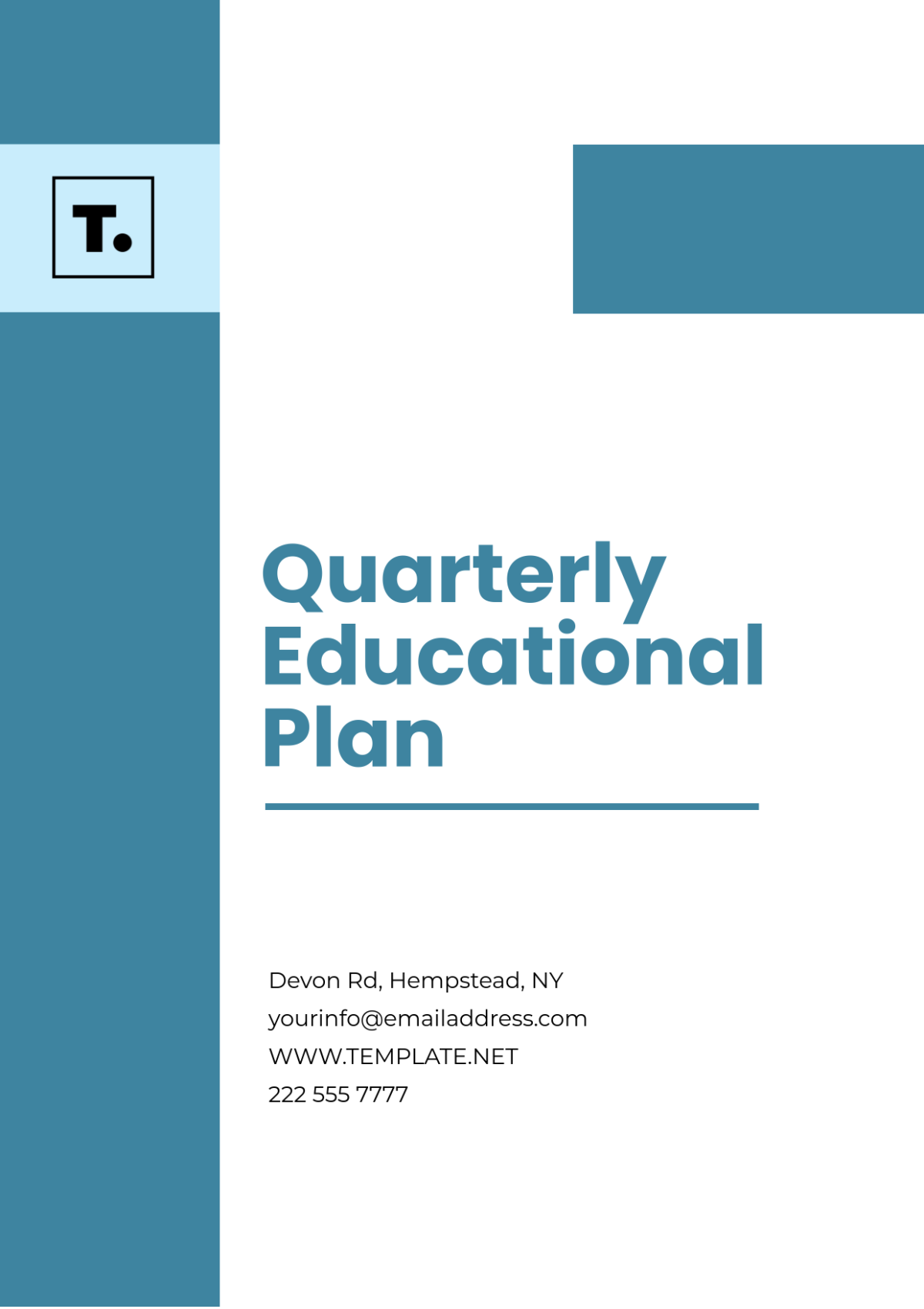
Quarterly Educational Plan
Overview
The Quarterly Educational Plan for 2053 is designed to cultivate an innovative and adaptive learning environment that meets the diverse needs of students in an increasingly complex world. By integrating cutting-edge technology, emphasizing critical thinking, and fostering inclusivity, we aim to empower students to become lifelong learners and active participants in their communities.
Key Objectives
Integrate Advanced Technology: Leverage artificial intelligence, augmented reality, and virtual reality to create engaging and personalized learning experiences.
Promote Lifelong Learning: Inspire a culture of continuous education through community resources and online platforms that extend beyond traditional schooling.
Foster Critical Thinking and Collaboration: Implement project-based learning strategies that enhance problem-solving skills and promote teamwork.
Ensure Inclusivity: Develop programs and initiatives that cater to diverse learning styles, backgrounds, and abilities, ensuring every student has equal opportunities to thrive.
Quarter 1: January - March
Goals
Seamlessly implement technology-enhanced learning tools in classrooms.
Launch mentorship programs connecting students with industry professionals.
Activities
Professional Development Workshops
Conduct a series of interactive workshops focused on incorporating AI tools, data analytics, and gamified learning strategies in lesson planning.
Invite technology leaders and educators to share best practices and innovative teaching methods that leverage emerging technologies.
Mentorship Program
Establish a structured mentorship initiative that pairs students with experienced professionals in their fields of interest. This program will include monthly virtual meetups and career exploration sessions.
Facilitate networking events where mentors and mentees can engage in hands-on activities, such as job shadowing and skill-building workshops.
Technology Integration
Deploy state-of-the-art virtual reality labs to facilitate immersive learning experiences, allowing students to explore complex subjects in a simulated environment.
Implement adaptive learning platforms that utilize machine learning to tailor educational content to individual student needs, enabling personalized learning pathways.
Evaluation Criteria
Collect qualitative feedback from teachers regarding the effectiveness and usability of new technology tools.
Monitor student engagement and participation rates in mentorship activities through surveys and attendance records.
Assess improvements in academic performance through comparative analysis of pre- and post-implementation data.
Quarter 2: April - June
Goals
Enhance student well-being and mental health support services.
Increase community engagement and collaboration in educational initiatives.
Activities
Mental Health Awareness Campaign
Launch a comprehensive mental health awareness initiative featuring workshops, seminars, and interactive activities designed to educate students and parents about mental health issues.
Collaborate with local mental health organizations to provide resources, support services, and training for teachers on recognizing and addressing mental health concerns in the classroom.
Community Engagement Projects
Establish a Community Service Learning Program that encourages students to participate in local service projects, fostering a sense of social responsibility and civic engagement.
Partner with local businesses and organizations to sponsor educational events, providing students with opportunities for hands-on learning and real-world experience.
Cultural Exchange Programs
Initiate international partnerships with schools across the globe, enabling students to engage in virtual cultural exchange programs that broaden their perspectives and understanding of global issues.
Organize Cultural Heritage Days within the school, allowing students to share their cultural backgrounds through presentations, performances, and food festivals.
Evaluation Criteria
Assess participation rates in mental health programs and community service initiatives through surveys and attendance metrics.
Gather feedback from community partners on the impact and effectiveness of collaborative projects.
Analyze student well-being through periodic surveys to track changes in mental health awareness and attitudes.
Quarter 3: July - September
Goals
Strengthen and promote STEM education initiatives.
Advocate for environmental sustainability and social responsibility.
Activities
STEM Challenges and Competitions
Organize annual inter-school STEM competitions that challenge students to develop innovative solutions to real-world problems, fostering creativity and critical thinking.
Host coding boot camps and workshops on emerging technologies such as robotics, AI, and data science to equip students with essential skills for future careers.
Sustainability Projects
Launch a school-wide recycling initiative aimed at reducing waste, promoting sustainability practices, and educating students about environmental stewardship.
Conduct tree-planting events and sustainability fairs that engage students and the community in discussions about climate change, biodiversity, and renewable resources.
Partnerships with Tech Companies
Collaborate with leading tech firms to secure sponsorships and resources for STEM initiatives, providing students with exposure to industry practices and innovations.
Organize guest speaker events featuring professionals from STEM fields to inspire students and provide insights into various career paths.
Evaluation Criteria
Measure student participation and performance in STEM competitions and boot camps.
Evaluate the success of sustainability initiatives through metrics such as the volume of recycled materials collected and community involvement.
Analyze student feedback on guest speaker events and workshops to assess their effectiveness in fostering interest in STEM careers.
Quarter 4: October - December
Goals
Conduct a comprehensive assessment of the academic year’s initiatives.
Strategically plan for the upcoming year based on insights gained.
Activities
Comprehensive Assessment
Implement a holistic evaluation process that includes standardized assessments, formative evaluations, and qualitative feedback to gauge student learning outcomes and program effectiveness.
Administer surveys to gather feedback from students, parents, and teachers, focusing on their experiences and perceptions of educational initiatives throughout the year.
Reflection Workshops
Facilitate reflection workshops for educators, enabling them to share successes and challenges faced during the academic year while brainstorming improvements for future initiatives.
Conduct student-led discussions and forums to empower students to voice their thoughts on their educational experiences and suggest changes.
Planning for 2054
Based on evaluation results and feedback, develop strategic goals for the next academic year that focus on enhancing educational quality and student engagement.
Introduce new initiatives and refine existing programs to align with emerging educational trends and community needs.
Evaluation Criteria
Analyze assessment results to identify strengths and areas for improvement across various educational initiatives.
Summarize feedback from reflection workshops and student discussions to inform strategic planning.
Create a detailed action plan for the upcoming year, outlining specific initiatives, resources required, and key performance indicators.
Conclusion
The Quarterly Educational Plan for 2053 serves as a dynamic framework for fostering innovation, inclusivity, and community engagement within the educational landscape. By focusing on the integration of advanced technologies, the promotion of mental health, and a commitment to sustainability, we aim to equip our students with the knowledge, skills, and values necessary for success in a rapidly changing world.
- 100% Customizable, free editor
- Access 1 Million+ Templates, photo’s & graphics
- Download or share as a template
- Click and replace photos, graphics, text, backgrounds
- Resize, crop, AI write & more
- Access advanced editor
Quarterly Educational Plan Template, offered by Template.net. This customizable template allows educators to efficiently outline curriculum goals, assessment strategies, and instructional methods for each quarter. Easily downloadable and printable, it ensures seamless integration into your teaching process. Plus, it’s editable in our AI Editor Tool, making updates a breeze. Optimize your educational strategies today!
You may also like
- Finance Plan
- Construction Plan
- Sales Plan
- Development Plan
- Career Plan
- Budget Plan
- HR Plan
- Education Plan
- Transition Plan
- Work Plan
- Training Plan
- Communication Plan
- Operation Plan
- Health And Safety Plan
- Strategy Plan
- Professional Development Plan
- Advertising Plan
- Risk Management Plan
- Restaurant Plan
- School Plan
- Nursing Home Patient Care Plan
- Nursing Care Plan
- Plan Event
- Startup Plan
- Social Media Plan
- Staffing Plan
- Annual Plan
- Content Plan
- Payment Plan
- Implementation Plan
- Hotel Plan
- Workout Plan
- Accounting Plan
- Campaign Plan
- Essay Plan
- 30 60 90 Day Plan
- Research Plan
- Recruitment Plan
- 90 Day Plan
- Quarterly Plan
- Emergency Plan
- 5 Year Plan
- Gym Plan
- Personal Plan
- IT and Software Plan
- Treatment Plan
- Real Estate Plan
- Law Firm Plan
- Healthcare Plan
- Improvement Plan
- Media Plan
- 5 Year Business Plan
- Learning Plan
- Marketing Campaign Plan
- Travel Agency Plan
- Cleaning Services Plan
- Interior Design Plan
- Performance Plan
- PR Plan
- Birth Plan
- Life Plan
- SEO Plan
- Disaster Recovery Plan
- Continuity Plan
- Launch Plan
- Legal Plan
- Behavior Plan
- Performance Improvement Plan
- Salon Plan
- Security Plan
- Security Management Plan
- Employee Development Plan
- Quality Plan
- Service Improvement Plan
- Growth Plan
- Incident Response Plan
- Basketball Plan
- Emergency Action Plan
- Product Launch Plan
- Spa Plan
- Employee Training Plan
- Data Analysis Plan
- Employee Action Plan
- Territory Plan
- Audit Plan
- Classroom Plan
- Activity Plan
- Parenting Plan
- Care Plan
- Project Execution Plan
- Exercise Plan
- Internship Plan
- Software Development Plan
- Continuous Improvement Plan
- Leave Plan
- 90 Day Sales Plan
- Advertising Agency Plan
- Employee Transition Plan
- Smart Action Plan
- Workplace Safety Plan
- Behavior Change Plan
- Contingency Plan
- Continuity of Operations Plan
- Health Plan
- Quality Control Plan
- Self Plan
- Sports Development Plan
- Change Management Plan
- Ecommerce Plan
- Personal Financial Plan
- Process Improvement Plan
- 30-60-90 Day Sales Plan
- Crisis Management Plan
- Engagement Plan
- Execution Plan
- Pandemic Plan
- Quality Assurance Plan
- Service Continuity Plan
- Agile Project Plan
- Fundraising Plan
- Job Transition Plan
- Asset Maintenance Plan
- Maintenance Plan
- Software Test Plan
- Staff Training and Development Plan
- 3 Year Plan
- Brand Activation Plan
- Release Plan
- Resource Plan
- Risk Mitigation Plan
- Teacher Plan
- 30 60 90 Day Plan for New Manager
- Food Safety Plan
- Food Truck Plan
- Hiring Plan
- Quality Management Plan
- Wellness Plan
- Behavior Intervention Plan
- Bonus Plan
- Investment Plan
- Maternity Leave Plan
- Pandemic Response Plan
- Succession Planning
- Coaching Plan
- Configuration Management Plan
- Remote Work Plan
- Self Care Plan
- Teaching Plan
- 100-Day Plan
- HACCP Plan
- Student Plan
- Sustainability Plan
- 30 60 90 Day Plan for Interview
- Access Plan
- Site Specific Safety Plan
